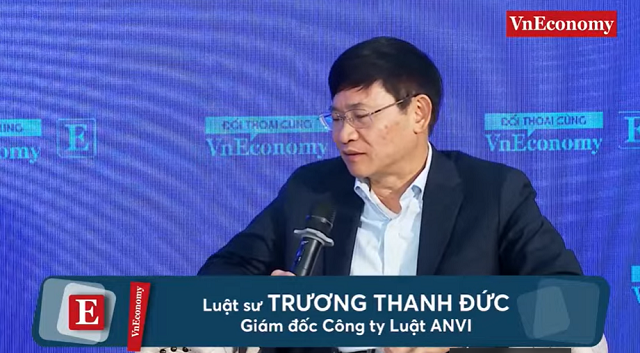How to Prevent Cross-Ownership but Still Ensure Shareholders’ Benefits?
In the Banks and Credit Institutions Law (amended) recently passed on January 18, 2024, there are provisions to limit the ownership ratio of banks to prevent cross-ownership. The question is how to prevent cross-ownership while still protecting the legitimate rights of shareholders.
 Screenshot
|
Dr. Nguyen Quoc Hung – Vice Chairman cum Secretary General of the Vietnam Banking Association evaluates that reducing the ownership limit is one of the provisions aimed at preventing manipulation of banks. This is a necessary measure to reduce the dominance of credit institutions.
However, in order to stabilize the reduction ratio, the Law also has provisions for gradual implementation until the ratio is brought to the prescribed level. However, this is just one of the minimizing provisions, alongside many other provisions.
Lawyer Truong Thanh Duc – Director of ANVI Law Firm suggests that in order to avoid gaps leading to banking risks, there are many factors to consider. First is the ownership ratio, second is the lending ratio, and third is other management matters. However, in reality, there have been many cases and lessons learned, so it is necessary to tighten all procedures.
The second issue to be tightly controlled is the source of funds. In reality, there are still cases of bank “draining”. The third issue is also important, which is that the Government also requires law enforcement.
But in reality, is there a situation of exceeding the prescribed ratio? The new law has adjusted many different aspects, hoping that the provisions will have an impact on the reality and bring about positive changes.
Regarding the issue of shareholders owning more than 1% of capital must disclose information, Dr. Nguyen Quoc Hung evaluates that this content originates from the reality that many shareholders do not appear on the shareholder list but represent over 90%, but there is no transparency.
In order for people to see that this shareholder is capable, has unrestricted capital investment, but owns a 1% stake in the charter capital of a credit institution, related personal information and financial status must be disclosed, so that people know that this is true capital, not someone else’s name listed as a shareholder, in order to limit domination.
Credit capital is only supplementary capital, it is necessary to promote and develop the capital market
The law stipulates the reduction in the limit ratio of credit issuance to customers and related customer groups according to a roadmap. Dr. Nguyen Quoc Hung believes that if the credit issuance ratio is immediately reduced, it will affect the quality of credit. However, since the Law provides for a 5-year roadmap, it will not have an impact. Because credit institutions cannot concentrate credit on one group of customers in their operations, in order to limit risk and ensure safety.
Secondly, the Law also aims to promote the development of the capital market.
Thirdly, how to ensure that credit institutions agree to open a commitment to joint financing, and not concentrate on one customer group. Businesses should also diversify their sources of borrowing, not only concentrating on one credit institution. The problem is whether the project is effective or not, the banks will arrange capital for joint financing.
This roadmap also will not affect organizations and enterprises when implementing projects, they have the means to access other credit institutions or invite credit institutions to participate in financing for those customers.
It is necessary to promote and develop a stable capital market for organizations and enterprises to raise capital for production and business activities in the capital market, without putting pressure on the capital of credit institutions.
Credit capital is only supplementary capital, not long-term investment capital. The capital mobilized by banks is mainly short-term and cannot provide enough resources for long-term loans. Therefore, it is unreasonable to put all capital into credit institutions, so it is necessary to expand to other sources of capital.
How to exploit legal loopholes?

Screenshot
|
Lawyer Truong Thanh Duc proposes that instead of the 1% ownership ratio only disclosing information, it is necessary to publicly disclose the entire list of shareholders. Only with transparency can there be effective supervision.
For banks to be professional and sustainable, they must ensure even the lowest lending rate meets the standard and ensures safety. The second is inspection and supervision, which must be strengthened to pay attention to these cases.
Mr. Hung added that in order to control manipulation, it is not just a matter of setting a credit limit ratio and disclosing information of individuals with a 1% ownership ratio, but also to enhance the role of the Board of Directors (BOD) and BKS, increase the number of independent BOD members.
The role of the BKS of credit institutions is very important. In addition, inspection and supervision must detect in time, which is mainly the responsibility of the credit institution’s BKS, monitoring reports regularly.
There are many incomplete provisions in the new Law, but it also limits some extent of cross-ownership and manipulation of credit institutions.
In the future, the State Bank of Vietnam (SBV) will issue circulars and credit institutions and state management agencies will also participate in implementation, so that the Law enters into life, legal normative documents also guide how to not affect the activities of credit institutions and people’s access to capital.
“Businesses also need to determine that if there is a capital shortage, not just think about banks, if there is a shortage of medium and long-term capital, they must think about the capital market. When there is a short-term capital shortage, only then should they think about banks and have the mindset of not concentrating capital in one bank but calling for joint financing for large and effective projects,” emphasized Dr. Nguyen Quoc Hung.















